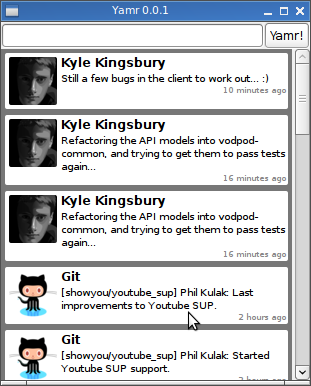I’ve been wary of Facebook’s privacy settings for a long time. I set mine to the most restrictive possible back when they announced Beacon. Since then they’ve released new features on a regular basis, each of which seems to share information about me without my knowledge or permission. You know what, Facebook? Fuck that.
I even disabled the most recent feature–“instant personalization”, which allowed third party websites to read my information on page load. Yet my friends can still, according to FB, share my info with any third party. Name, picture, gender, city, friend list, pages, and more. I have to explicitly block each and every app that wants my data. I don’t even know how many there are! That “recommend” button? Gives the app access to your data and permission to publish to your feed indefinitely.
Even with instant personalization disabled, CNN.com shows my friends and their profile images on the main page, merged with what CNN stories they liked recently. That’s too much for me.
Some recent reports have suggested incidents of scientific misconduct in the climate science community. While that is not evidence of incorrect conclusions, it does cast some doubt on the findings of the organizations involved–and right so, I believe. The APS newsletters for December and January have been chock-full of climate discussion–arguing for the retraction of the APS’s climate change statement or alteration to reflect uncertainty, counterarguments, and so forth.
My personal take on it is this: climate is really effing complicated. I know a little about the scientific method, publishing, data analysis, and review, but basically have no awareness of the intricacies of modeling the world’s atmosphere and hydrology. I’m also aware that plenty of people have significant personal and economic interests in the matter, and an underabundance of understanding. The only reasonable conclusion I can come to is this: trust the people who spend their lives trying to understand climate, and maintain some awareness of their methods. It is my belief, from the limited reading I’ve been able to do, that the vast majority of climate researchers are doing good science, and working hard to understand and explain to others a very complex problem.
Anyway, that’s why I think RealCimate’s analysis of the recent challenges over the IPCC’s AR4 is a good read.
I’ve seen a lot of misunderstood physics out there, but watching Andy Schafly try to insist general relativity is wrong and useless has got to take the cake. Kate Sorenson tries patiently to correct the GR article’s mistakes, but is eventually banned for her troubles. Andy finishes with this amazing quote:
One way to evaluate religions, or quasi-religions, is to look at the fruit it bears. What has it helped achieved? In the case of relativity, it has produced nothing. Nil. Zippo. After nearly 100 years and a ton of money. If you find the math in relativity fun, great, but relativity is not going to help anyone. It never has. Pick up a Bible in between some equations.–Andy Schlafly 18:31, 15 November 2009 (EST)
Justin and I have been thinking about starting a social justice site for a while now. We’ve talked it over with some friends and associates who are interested in writing about equality, and launched the site over the weekend. Take a look at the new Engine of Change.
Here’s the quickest way I know to get Eclipse up and running with the Android SDK plugin. To install each of these packages, go to Help->Install New Software, add the given URI as a package source, and install the given package. Eclipse may prompt you to restart after some installs.
| Source | Package |
|---|---|
| http://download.eclipse.org/tools/gef/updates/releases/ | GEF SDK |
| http://download.eclipse.org/modeling/emf/updates/releases/ | EMF SDK 2.5.0 (EMF + XSD) |
| http://download.eclipse.org/webtools/updates | Web Tools Platform / Eclipse XML Editors and Tools |
| https://dl-ssl.google.com/android/eclipse/ | Developer Tools |
That should do it for you!
Last night I left my Droid sitting on my desk, at about 80% charge. An hour later I picked it up and it wouldn’t turn on. No response to pressing or holding the power button, and even replacing the battery didn’t get it to turn on. I figured the battery was drained and plugged it in this morning–whereupon it booted up and showed 75% charged!
The Verizon store was disappointing. They told me I had installed too many apps and should run advanced task killer frequently. Really, guys? You think I ran out of battery and recharged to 70% in a matter of seconds this morning? No suggestions as to how to hard-reset the device. They also disavowed the autofocus bug… which neatly explains why the camera focuses in under two minutes as of this morning. I guess I should have expected the runaround to begin with.
Other than that, I love the device. It’s easily the most responsive UI out of all the phones I’ve played with, including the iPhone. There are some software oversights–I can’t move emails between folders, for example–but by and large it’s been pretty solid.
$ adb devices
List of devices attached
???????????? no permissions
A few things have changed since the Android docs were written. If you want to talk to your Motorola Droid via ADB in Ubuntu 9.10 Karmic, I recommend the following udev rule.
# /etc/udev/rules.d/99-android.rules
SUBSYSTEM=="usb", ATTRS{idVendor}=="22b8", SYMLINK+="android_adb", MODE="0666" GROUP="plugdev"


Sometime in the last couple of weeks, the Yammer AIR client stopped fetching new messages. I’ve grown to really like the service, especially since it delivers a running stream of commits to the Git repos I’m interested in, so I broke down and wrote my own client.
Yamr is a little ruby/gtk app built on top of jstewart’s yammer4r and the awesome danlucraft’s Ruby Webkit-GTK+ bindings. No seriously, Dan, you rock.
All right boys and girls, I’m all for quality releases and everything, but Cortex Reaver 0.2.0 is raring to go. Just gem upgrade to get some awesome blogging goodness.
I threw together a little jQuery tag editor last weekend for Cortex Reaver, since hours of google searching turned up, well, not much. Feel free to try the demo and use it for your projects.

